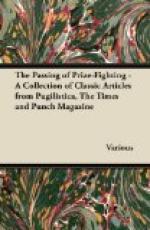* * * * *
OPERATIC NOTES.
Monday.—Lohengrin. House full to hear Brother JOHN and Madame MELBA. “Please, Sir, Mr. JOHNNIE DE RISKY ain’t here,” blurts out the pale and trembling call-boy.
[Illustration: Cherubino takes the Chair at a small Meeting. A De Risky situation.]
Sir AUGUSTUS calm, impassible. Crisis. If no one turned up, he would act the part himself, and, it being Wagnerian music, the orchestra would play what of the part had to be played. At that moment lounged in Monsieur VAN DYCK, just to see how things were going on without him. “I’m a little hoarse to-night,” quoth VAN DYCK, pleasantly. “Nonsense!” cries Sir DRURIOLANUS, cheerily, “a ‘Van’ can never be a little hoarse.” Much merriment. “DYCK, my boy,” continues Sir D., “you’ve come in the very nick of time—quite a Devil’s Dyke, you are,”—the accomplished vocalist was in ecstasies at his Manager’s joke,—“and you shall distinguish yourself to-night as Lohengrin!” Oh, what a surprise! No sooner said than done. Armour for one ordered immediately. ISAAC of York Street goes to work, and—presto!—VAN DYCK is “ready in case.” “Now,” asks DRURIOLANUS, “what are we waiting for?”
“Please, Sir, Madame MELBA isn’t here!”
“MELBA not here to play Elsa!” exclaims Sir DRURIOLANUS, immediately adding, with that wit which is always, like the British Tar, ’Ready, aye ready!’—“then we must get somebody Else Sir!” and scarcely had the words escaped his lips, than Madame NORDICA, who happened to be passing by, sang out in an extempore recitative, “Me voici!” “Bravissima!” cried Sir DRURIOLANUS. “Saved! Saved!” General dance of joy.
So the Curtain was rung up, and the Opera, with Madame NORDICA (vice MELBA) as Elsa, and VAN DYCK (vice Little JOHNNIE THE RISKY) as Lohengrin, made a big success. House crowded. All’s well that ends as well as this.
[Illustration: Sir Druriolanus, M.P.(ressario) for Covent Garden.]
Tuesday with Mozart.—What a good starting idea for a Comic Opera would be the notion of making those two types of knaves, Leporello and Figaro, meet as counter-plotters. Monsieur MAUREL suggests a step in this direction, when one night he impersonates the gay Spanish Don, and on another he appears as the roguish Italian barber, no longer an intriguing bachelor but a jealous bridegroom. Merry Melodious MOZART! Old-fashioned he may be, like not a few of the best melodies and the best stories. Elegant Countess is Madame EMMA EAMES. Can she possibly ever have been Rosina, Dr. Bartolo’s tricky ward! What a change matrimony makes in some folks! Old Dr. Bartolo bears not much resemblance to the other Dr. Bartolo, and Don Basilio, a kind of Ecclesiastical lawyer, is quite a rollicking wag as compared with the Basilio




